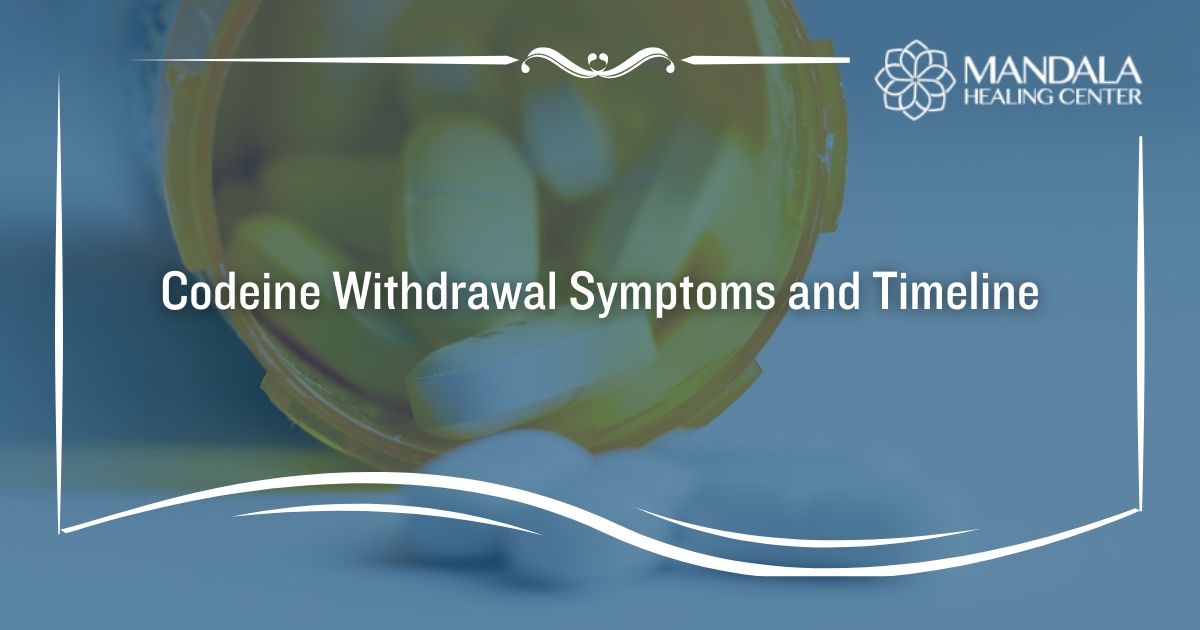Opioid addiction is a serious problem in the United States. According to the National Institutes of Health (NIH), opioids were responsible for 80,411 overdose deaths in 2021.[1] Opioids are a class of drugs that include substances like hydrocodone, oxycodone, methadone, heroin, fentanyl, codeine, and more.
While heroin and oxycodone are some of the most commonly abused opioids, every opioid is addictive. Many people struggle with an addiction to an opioid known as codeine. Codeine is commonly prescribed to treat mild to moderate pain or relieve coughing.[2]
Despite the medicinal uses of codeine, this substance can lead to dependency and addiction after only taking it for a short period. Abruptly stopping the use of codeine can result in moderate to severe symptoms of withdrawal. How long codeine withdrawal lasts and how severe your symptoms become depend on how long you’ve been using codeine and other factors.
What are the Symptoms of Codeine Withdrawal?
Codeine withdrawal occurs when you stop using the substance after a period of dependency. While opioid withdrawal is usually not life-threatening, it can be incredibly difficult to cope with. Many people who attempt to detox at home end up relapsing to soothe their symptoms.
The symptoms of codeine withdrawal include:[3]
- Runny nose and teary eyes
- Excessive sweating
- Yawning
- Anxiety
- Trouble sleeping
- Restlessness
- Goosebumps or shivering
- Muscle and bone pain
- Fever
- Increased heart rate
- Stomach cramps
- Nausea and vomiting
- Diarrhea
If you or a loved one are addicted to codeine, you must seek help from a medical detox program. Relapsing on codeine after a period of abstinence could lead to an accidental overdose, making it vital that you are receiving treatment.
What Factors Affect How Long Codeine Withdrawal Lasts?
The exact length of time that codeine withdrawal lasts will depend on a variety of factors. For example, someone who has been addicted to codeine for years might have symptoms longer than a person who was only dependent for a few months.
The factors that affect how long codeine withdrawal lasts include:
- The length of time you were addicted to codeine
- The frequency and dosage of codeine you consumed
- Whether you abused other substances
- Your overall health
- Age, weight, and metabolism
- The health of your kidneys and liver
- Whether you are receiving medical treatment
Understanding the Codeine Withdrawal Timeline
While the length of time codeine withdrawal lasts can differ slightly, most people follow the same general timeline.
8 to 24 Hours
Typically, people begin experiencing withdrawal symptoms about 8 hours after their last dose of codeine. However, it can take up to 24 hours to experience symptoms depending on how long and how often you use codeine.
The initial symptoms of codeine withdrawal are typically mild, including symptoms like runny nose, teary eyes, irritability, and trouble sleeping.
48 to 72 Hours
Between 48 to 82 hours your withdrawal symptoms will begin to peak. This means that they will be at their most severe, making it vital that you are receiving professional care from a medical detox center.
The symptoms you can expect to experience include:
- Muscle tension
- Severe anxiety
- Urges or cravings to use codeine
- Runny nose
- Headaches
- Irritability or agitation
- Nausea and vomiting
- Diarrhea
- Excessive sweating
- Dehydration
In severe cases, dehydration can be life threatening, so it’s always important to detox while under medical supervision.
72 Hours to 1 Week
After 72 hours, your withdrawal symptoms should begin to lessen in severity. Over the course of a week, most of your symptoms should completely subside. However, many people continue to experience the psychological symptoms of codeine withdrawal for much longer. Thankfully, opioid detox and treatment programs can prescribe you medications to alleviate symptoms like anxiety, depression, or insomnia.
Finding Help for Codeine Withdrawal
If you or a loved one suffer from codeine addiction, it’s time to seek help.
At Mandala Healing Center, we can provide you with a full continuum of care. From medical detox to inpatient treatment and aftercare services, our program offers the comprehensive treatment you need to achieve long-term sobriety.
Mandala combines holistic healing with cutting-edge science for maximum effectiveness. We utilize the latest in detox medication to make the process as pain-free as possible. Mandala’s highly trained medical staff specializes in treating addiction, going above and beyond 24 hours a day, 7 days per week, 365 days per year to provide the safest detox possible while minimizing discomfort.
To learn more about our codeine addiction treatment program, contact us today.
References:
- The National Institutes of Health (NIH): Drug Overdose Death Rates, Retrieved July 2023 From https://nida.nih.gov/research-topics/trends-statistics/overdose-death-rates
- Medline Plus: Codeine, Retrieved July 2023 From https://medlineplus.gov/druginfo/meds/a682065.html
- Medline Plus: Opiate and opioid withdrawal, Retrieved July 2023 From https://medlineplus.gov/ency/article/000949.htm












